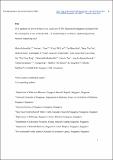2015 epidemic of severe Streptococcus agalactiae sequence type 283 infections in Singapore associated with the consumption of raw freshwater fish : a detailed analysis of clinical, epidemiological, and bacterial sequencing data
Abstract
Background : Streptococcus agalactiae (group B Streptococcus [GBS]) has not been described as a foodborne pathogen. However, in 2015, a large outbreak of severe invasive sequence type (ST) 283 GBS infections in adults epidemiologically linked to the consumption of raw freshwater fish occurred in Singapore. We attempted to determine the scale of the outbreak, define the clinical spectrum of disease, and link the outbreak to contaminated fish. Methods : Time-series analysis was performed on microbiology laboratory data. Food handlers and fishmongers were screened for enteric carriage of GBS. A retrospective cohort study was conducted to assess differences in demographic and clinical characteristics of patients with invasive ST283 and non-ST283 infections. Whole-genome sequencing was performed on human and fish ST283 isolates from Singapore, Thailand, and Hong Kong. Results : The outbreak was estimated to have started in late January 2015. Within the study cohort of 408 patients, ST283 accounted for 35.8% of cases. Patients with ST283 infection were younger and had fewer comorbidities but were more likely to develop meningoencephalitis, septic arthritis, and spinal infection. Of 82 food handlers and fishmongers screened, none carried ST283. Culture of 43 fish samples yielded 13 ST283-positive samples. Phylogenomic analysis of 161 ST283 isolates from humans and fish revealed they formed a tight clade distinguished by 93 single-nucleotide polymorphisms. Conclusions : ST283 is a zoonotic GBS clone associated with farmed freshwater fish, capable of causing severe disease in humans. It caused a large foodborne outbreak in Singapore and poses both a regional and potentially more widespread threat.
Citation
Kalimuddin , S , Chen , S L , Lim , C T K , Koh , T H , Tan , T Y , Kam , M , Wong , C W , Mehershahi , K S , Chau , M L , Ng , L C , Tang , W Y , Badaruddin , H , Teo , J , Apisarnthanarak , A , Suwantarat , N , Ip , M , Holden , M T G , Hsu , L Y , Barkham , T & Singapore Group B Streptococcus Consortium 2017 , ' 2015 epidemic of severe Streptococcus agalactiae sequence type 283 infections in Singapore associated with the consumption of raw freshwater fish : a detailed analysis of clinical, epidemiological, and bacterial sequencing data ' , Clinical Infectious Diseases , vol. 64 , no. suppl_2 , pp. S145-S152 . https://doi.org/10.1093/cid/cix021
Publication
Clinical Infectious Diseases
Status
Peer reviewed
ISSN
1058-4838Type
Journal article
Description
This work was primarily funded by the Ministry of Health, Singapore, awarded through the Singapore Infectious Disease Initiative grant (SIDI/2015/001). We were also supported by the Molecular Biology Laboratory and the Department of Laboratory Medicine, TTSH, Singapore. The culture analysis of fish was primarily funded by the National Environment Agency, Singapore. The statistical work was funded by the Project MODUS grant, while whole-genome sequencing and analysis were conducted at the Genome Institute of Singapore, partially funded by the POLARIS program, Agency for Science, Technology and Research (A*STAR) and the Singapore Ministry of Health’s National Medical Research Council (NMRC/CIRG/1357/2013).Collections
Items in the St Andrews Research Repository are protected by copyright, with all rights reserved, unless otherwise indicated.

